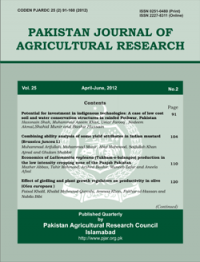SUITABILITY OF DIFFERENT FORMULATED CARRIERS FOR SUSTAINING MICROBIAL SHELF LIFE
Tosif Tabassam*, Tariq Sultan**, M.Ehsan Akhtar**, M.Mahmood-ulHassan** and Arshad Ali**
ABSTRACT
Non-availability of a suitable carrier for bioinnoculant is a serious constraint for dissemination of biofertilizer technology in Pakistan. Present study was designed to formulate a suitable carrier from locally available cheap material and evaluate for shelf life by using locally isolated plant growth promoting rhizobacteria (PGPR) strains from maize rhizosphere. Different combinations of material were prepared using clay soil (35-50%), fly-ash (30-45%), press mud (5-15%) and lignite (5-15%). Clay soil (53% clay) was used for adhesion purpose but considering free of lump formation an important property of a good carrier, mixing 40% of soil with other material was found suitable. Using 40% of soil, six different treatments were formulated and physico-chemical characteristics were determined. Four combinations in the range of 40% clay, 30-40% fly-ash, 10-15% press mud and 10-15% lignitic coal were selected which had good adhesion capacity, moisture holding capacity, nutrient contents and investigated for microbial shelf life. Significant difference regarding microbial survival was observed between different formulations as well as between different incubation intervals. Among different carrier tested the 8 8 -1 FC-4 supported the maximum population of 33.5x10 - 10.8x10 cfu g for 8 8 -1 MR-8 and 32.6x10 - 7.2x10 cfu g for MR-5. Results showed that the required population of PGPR was sustained in all the formulation tested up to six months of storage period.
To share on other social networks, click on any share button. What are these?






